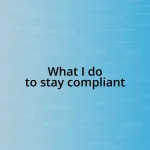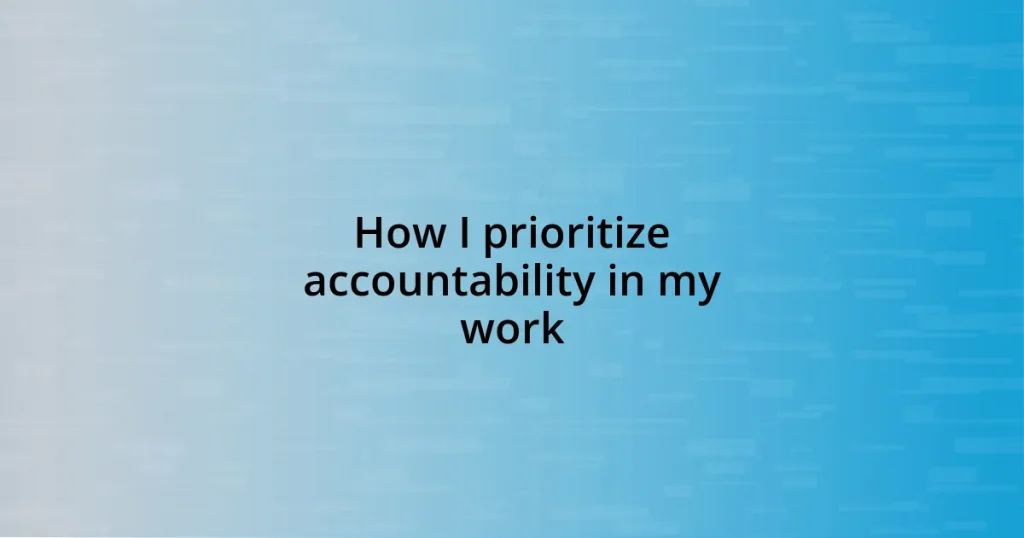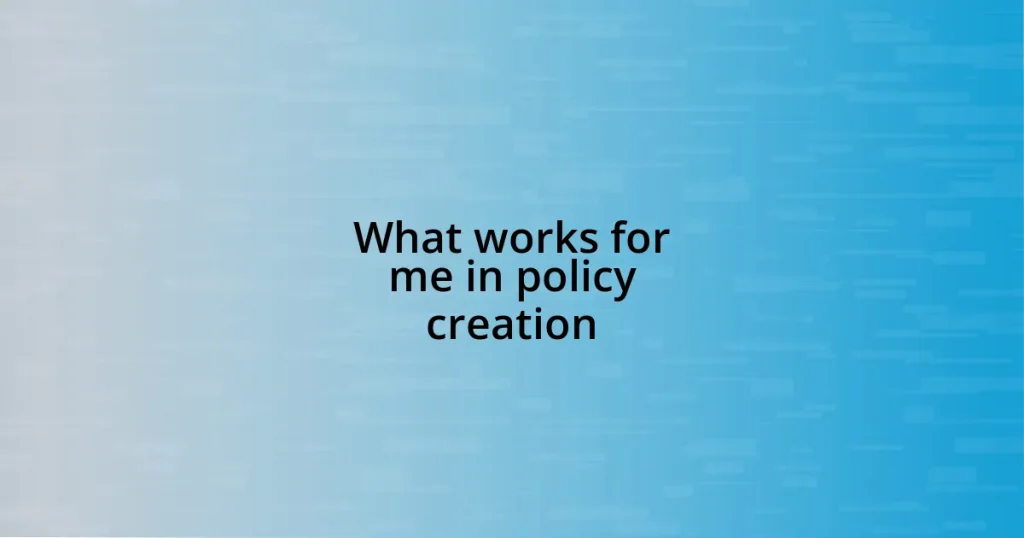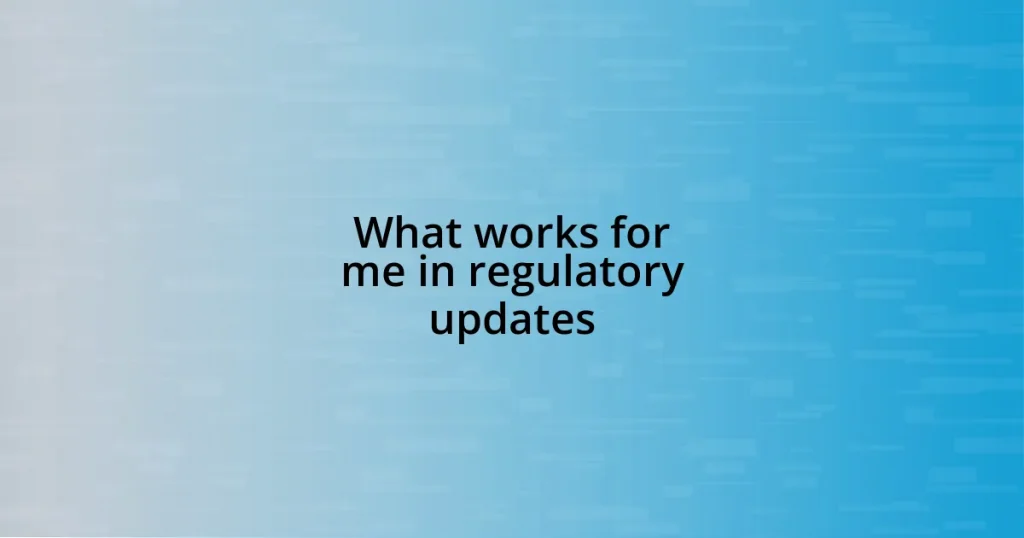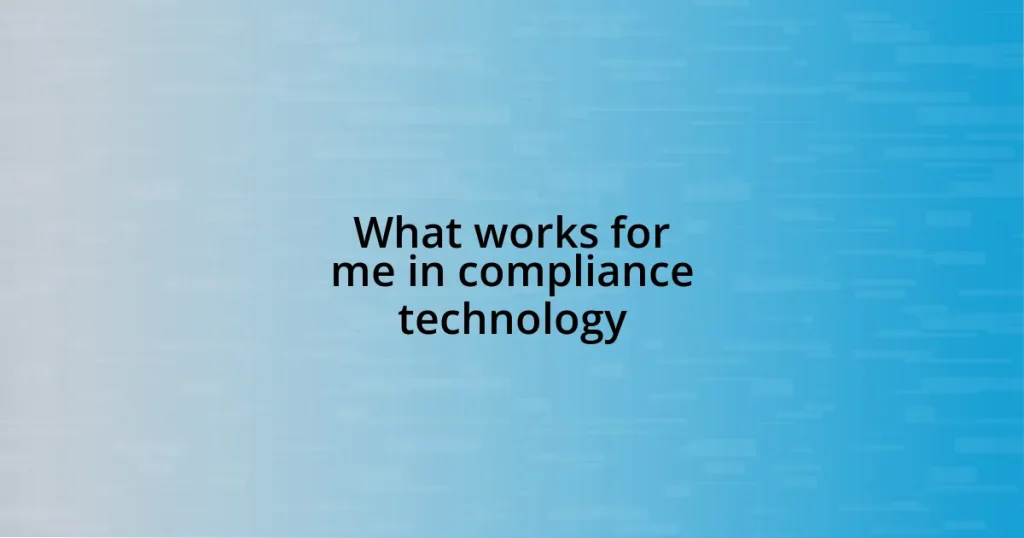Key takeaways:
- Accountability is a shared commitment that enhances team dynamics, performance, and trust among colleagues.
- Setting clear expectations and having open communication are critical for fostering accountability within teams.
- Regular self-assessment and seeking feedback from peers can reveal blind spots and promote continuous improvement.
- Utilizing digital tools and collaborative platforms can significantly improve tracking progress and enhancing accountability in projects.
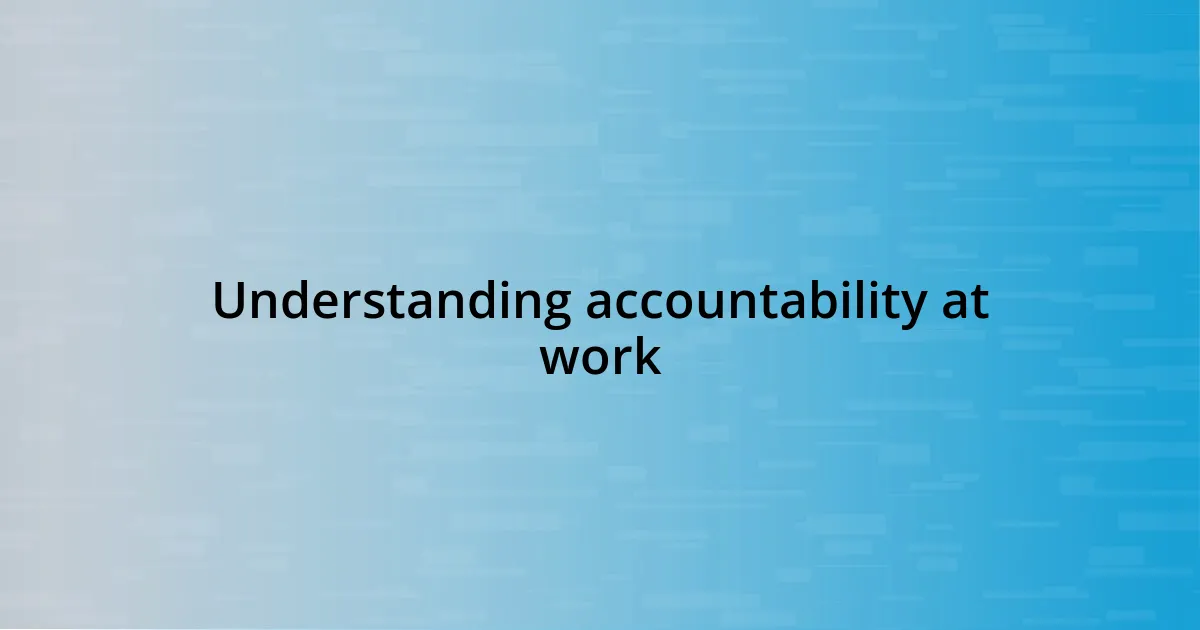
Understanding accountability at work
Accountability at work isn’t just about meeting deadlines or achieving targets; it’s a deeper commitment to our responsibilities and the impact of our decisions. I remember a time when I overlooked my role in a team project, thinking my contribution didn’t really matter. But when the project faltered, it highlighted how each of us affects the bigger picture, sparking a realization that accountability ties us all together.
What does accountability look like in practice? It’s not merely about checking off tasks on a to-do list; it’s about taking ownership of the results, good or bad. I’ve often found that when I own up to my mistakes, rather than deflecting blame, it not only fosters trust among colleagues but also encourages a supportive environment. Have you noticed how when one team member admits a misstep, others feel safer to do the same? This shared vulnerability can lead to growth.
I also believe that accountability thrives in a culture of open communication. For instance, after initiating weekly check-ins with my team, we saw a significant shift in how we hold one another accountable. It’s one thing to make promises in a meeting, but taking a moment each week to revisit those commitments builds a sense of shared responsibility. Does your workplace foster such dialogue? If not, consider the potential for deeper connections and enhanced teamwork—it can be transformative.
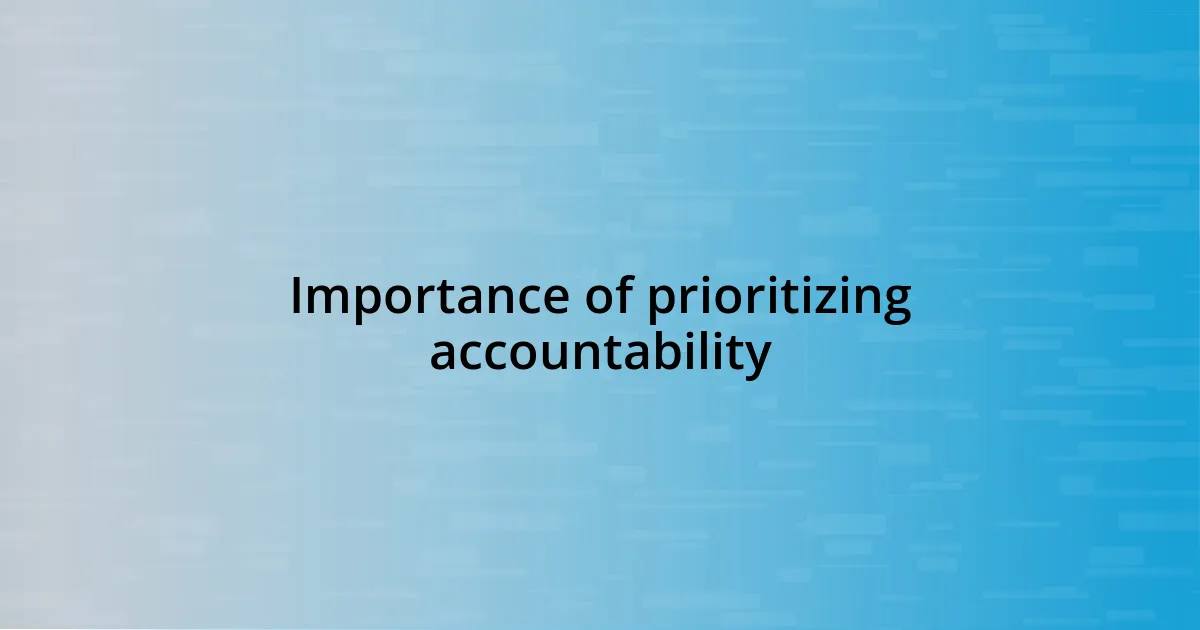
Importance of prioritizing accountability
Prioritizing accountability in the workplace is essential for fostering a culture of trust and collaboration. I once had a supervisor who emphasized the importance of accountability in every project meeting. His approach not only inspired me to take responsibility for my work but also encouraged my peers to do the same. It became clear that when everyone felt accountable, we collectively produced higher-quality results and developed stronger relationships.
Here’s why accountability is so crucial:
- Trust Building: When we hold ourselves accountable, we create a safe space for others to do the same, strengthening our team dynamics.
- Improved Performance: Taking ownership of our tasks leads to better outcomes and encourages a culture of high standards.
- Emotional Investment: Feeling accountable makes us more engaged in our work, as we see our contributions as vital to the team’s success.
- Constructive Feedback: A clear accountability framework allows for open discussions about performance, fostering growth and development.
- Sense of Ownership: When team members feel responsible for their work, it enhances their commitment to the organization and its goals.
In my experience, embedding accountability into our everyday practices not only elevates our work quality but also enriches our workplace culture, making it more fulfilling and rewarding for everyone involved.
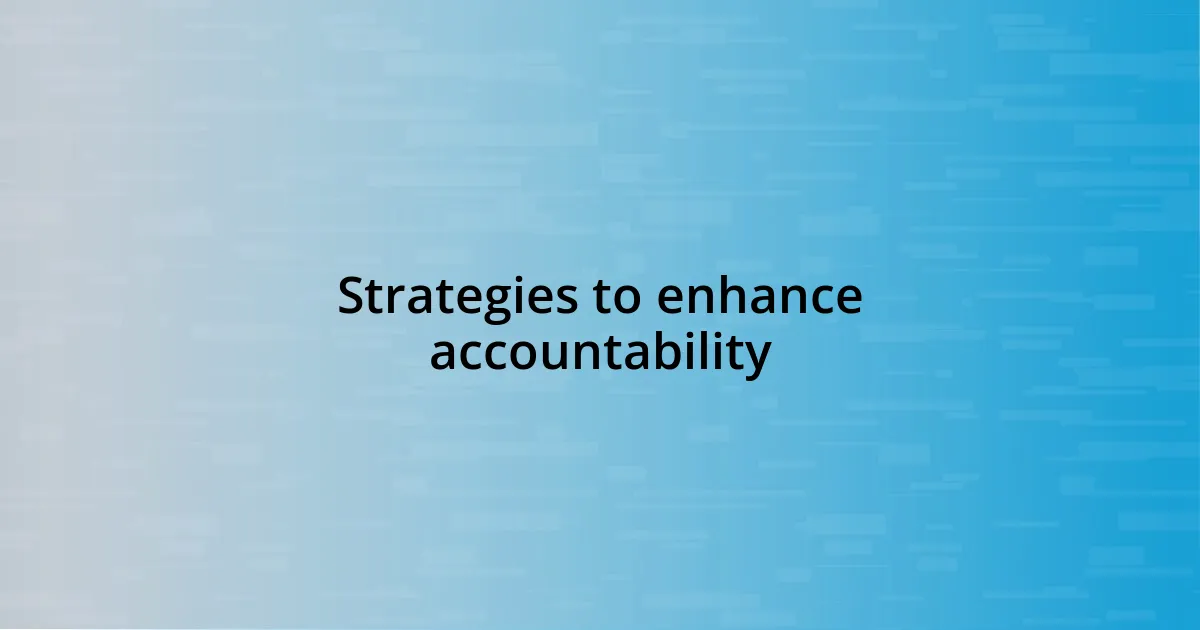
Strategies to enhance accountability
To enhance accountability, setting clear expectations is paramount. I’ve learned that when everyone knows what’s expected of them, there’s less ambiguity and more clarity in the responsibilities we each hold. For example, during a project I led, I noticed a stark improvement in our accountability once we defined each team member’s role and deliverables upfront. Instead of floundering with unclear duties, everyone stepped up, and I could almost feel the energy shift—when roles are crystal clear, people naturally take ownership.
Regular feedback loops also play a crucial role in fostering accountability. I vividly recall how instituting bi-weekly feedback sessions transformed my team’s dynamic. Initially, I was nervous about these conversations, fearing they might come off as confrontational. However, I quickly realized they allowed us to openly discuss our progress and any obstacles we faced. It was refreshing to see colleagues acknowledging their challenges and seeking support, making it easier to stay accountable for our work.
Moreover, utilizing accountability partners can significantly increase our commitment to tasks. I often pair up with a colleague to set mutual deadlines and check-in points, which creates a sense of obligation and motivation to follow through. It’s like having a built-in safety net; when one of us feels stuck, the other offers encouragement. I always find it inspiring—how accountability expands when we lean on one another.
| Strategy | Description |
|---|---|
| Clear Expectations | Define roles and responsibilities to eliminate ambiguity, empowering team members to take ownership. |
| Regular Feedback | Hold consistent feedback sessions to discuss progress and challenges, fostering an open environment. |
| Accountability Partners | Pair up with a colleague for mutual support and motivation, enhancing commitment to tasks. |
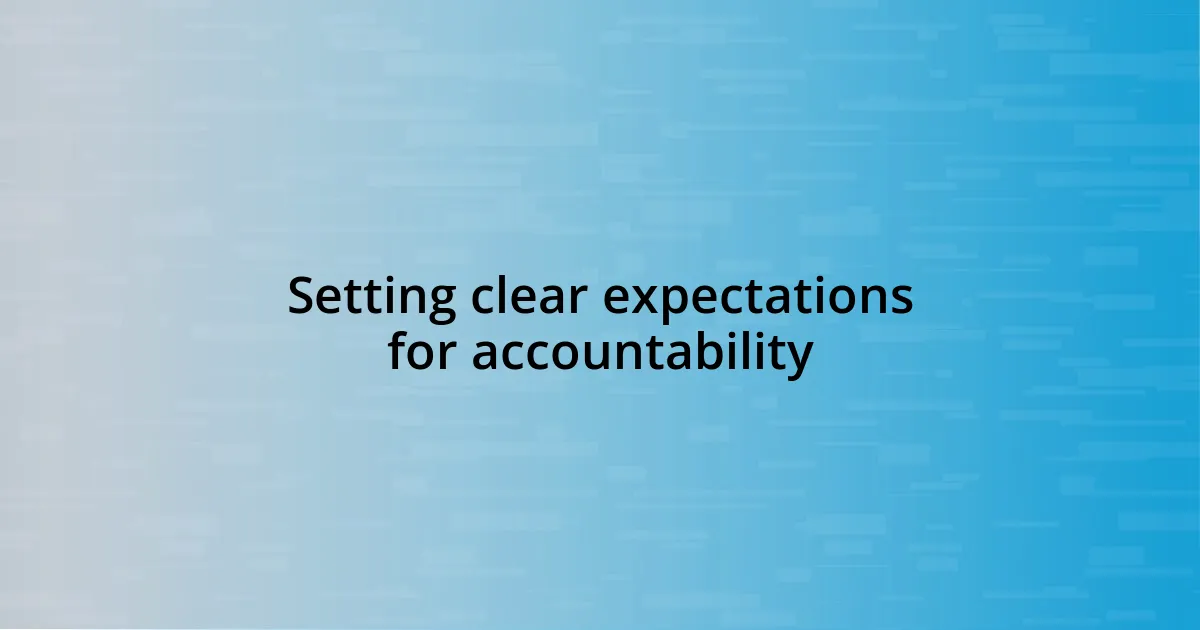
Setting clear expectations for accountability
I believe that setting clear expectations for accountability starts with having open conversations early on. In one of my projects, I gathered the team for a brainstorming session to outline our specific roles and deadlines. This wasn’t just a formality; I could feel the energy shift as each person expressed what they were responsible for. It was eye-opening to see how this clarity transformed the team dynamic—rather than hesitating, everyone dove headfirst into their tasks.
One memorable instance was when I found myself seeking clarity about my role during a particularly challenging project. I approached my lead with several questions about what was expected of me. She appreciated my initiative and not only clarified my responsibilities but also encouraged the rest of the team to voice similar concerns. That conversation taught me that when we articulate our expectations upfront, we’re not just setting the stage for success; we’re fostering a culture where asking questions is welcomed and celebrated.
As I reflect on the impact of clear expectations, I often wonder: how many projects could have been smoother with a little more upfront communication? I’ve noticed that when accountability is woven into our initial discussions, it becomes a shared commitment, rather than a burden. By making it a norm to clarify duties, I’ve seen teams flourish, feeling more engaged and connected, ultimately driving productivity and morale sky-high.
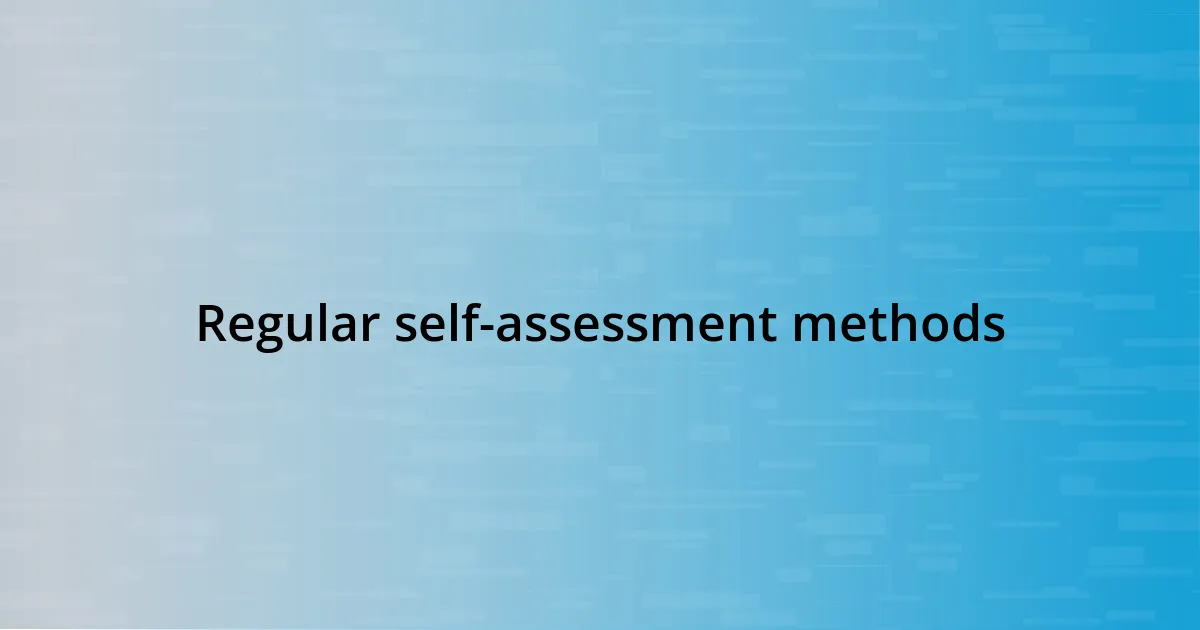
Regular self-assessment methods
Regular self-assessment is a vital method that keeps me aligned with my goals and values. I use reflective journaling as a tool, writing down my thoughts about what I accomplished each week and where I stumbled. It’s not just about critiquing my actions; it’s a chance to celebrate small victories and understand the emotions behind my challenges. As I look back through those entries, I can see patterns emerging that guide my personal and professional growth.
Another effective method I’ve adopted is setting aside time for self-review meetings. I allocate a quiet hour every month where I evaluate my progress against the benchmarks I established at the beginning of my projects. It’s during these sessions that I often find myself questioning whether I truly pushed my limits or if I played it safe. Experiencing that mix of pride and discomfort is powerful—it drives me to be more ambitious in my goals and allows me to reassess my strategies.
Lastly, I’ve found that asking for feedback from trusted colleagues is invaluable. When I approach them with specific questions, their insights often reveal blind spots I hadn’t considered. One time, a colleague pointed out that while I excelled in my tasks, I overlooked the importance of sharing my successes more broadly. That feedback shifted my focus, reminding me that accountability isn’t just personal; it involves fostering a community that uplifts and learns from each other. How often do we miss opportunities for growth because we shy away from seeking input? Understanding this has made me more proactive in creating a culture of continuous improvement—not just for myself but for those around me too.
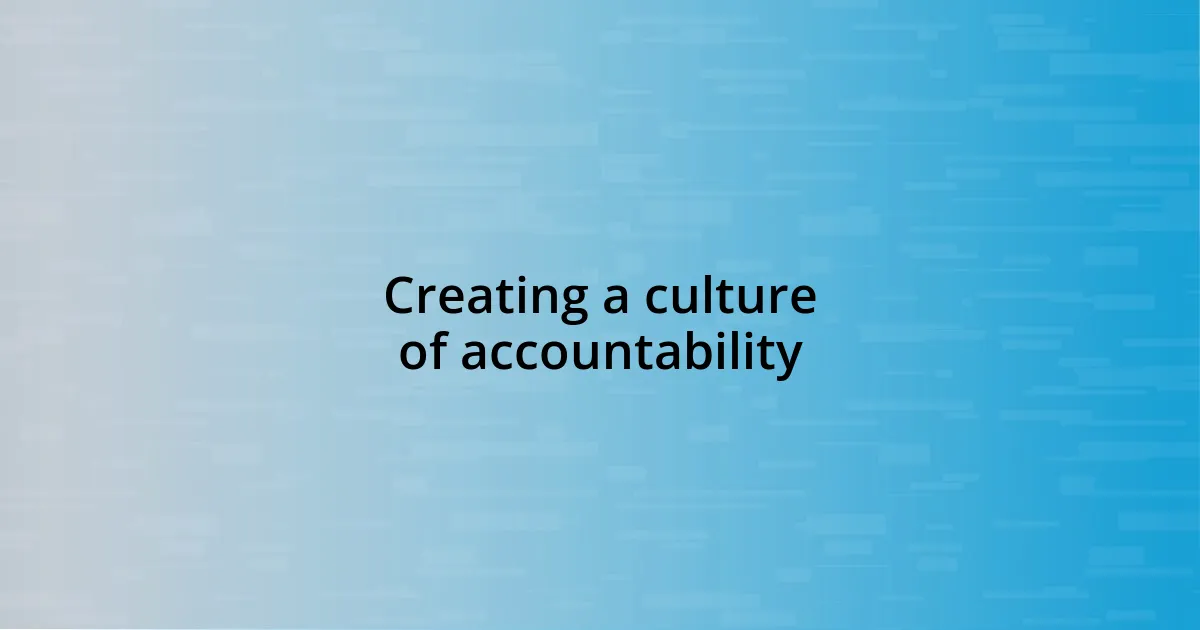
Creating a culture of accountability
Creating a culture of accountability requires a shared understanding rooted in trust and transparency. In one of my previous roles, I initiated bi-weekly check-ins, not just to track progress but to genuinely discuss concerns and triumphs. These gatherings created a safe space where team members felt comfortable admitting setbacks. I remember a colleague sharing his struggle with a project deadline, and rather than facing criticism, he received support—along with ideas that inspired everyone to brainstorm solutions together.
I’ve noticed that when individuals feel empowered to hold each other accountable, the reliance on hierarchical structures diminishes. For instance, I adopted a peer mentoring approach during team projects. This meant that instead of waiting for a manager to take charge, we all engaged in accountability. I recall the excitement when we celebrated a milestone together; it was clear that each contribution mattered, and the sense of ownership motivated everyone to dig deeper and strive for excellence. Why is it that we often hesitate to embrace collective responsibility? In my experience, when we step beyond our silos and acknowledge our interconnected roles within a team, accountability evolves from a task into a shared commitment.
Moreover, feedback loops can be a game-changer in cultivating this culture. I once experimented with anonymous suggestion boxes, encouraging team members to voice thoughts they might hesitate to share openly. Some responses surprised me; they highlighted areas I had never even considered. This practice reinforced the idea that accountability isn’t merely about managing tasks but creating an environment where everyone feels their perspectives hold value. It left me reflecting on this: How do we ensure everyone’s voice is not just heard but actively shaping our journey? Engaging with colleagues in this way transformed our dynamics, making it clear that every opinion matters in fostering an accountable culture.
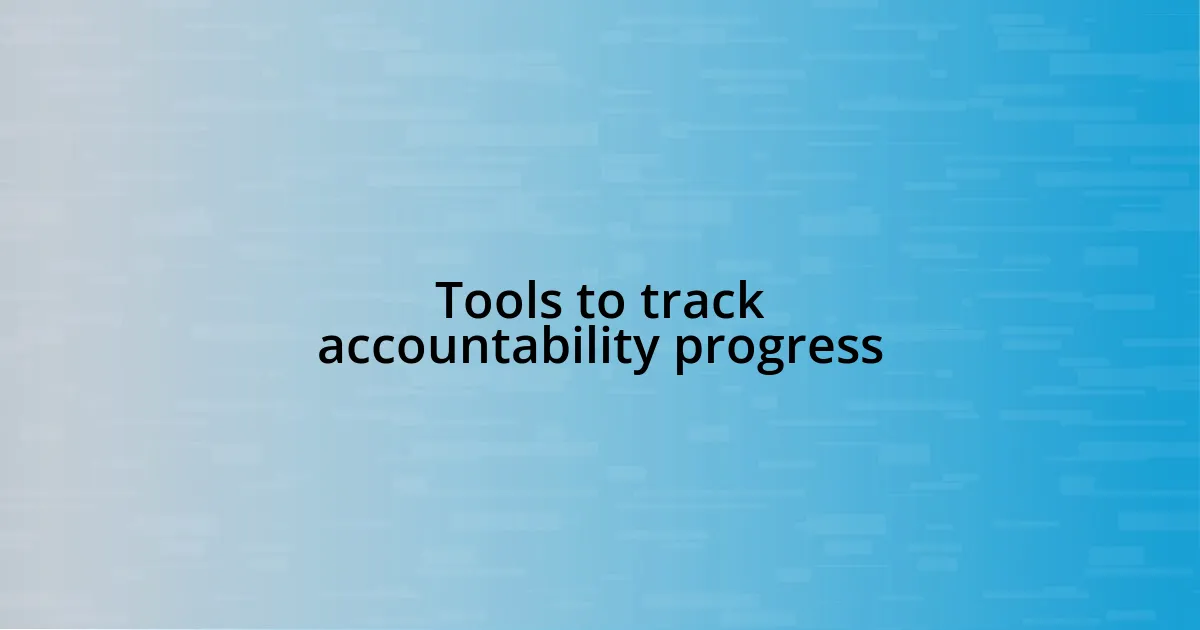
Tools to track accountability progress
To effectively track accountability progress, I rely heavily on digital tools that enhance visibility and organization. One of my favorites is Trello, where I can create boards for different projects and visualize tasks with deadlines. I remember a time when I used it to manage a big project launch; seeing each step laid out helped keep me and my team on track. How often do we underestimate the power of visualization in maintaining momentum?
Another tool that has made a significant impact on my accountability tracking is a habit-tracking app. I initially thought these apps were just for fitness goals, but they’ve proven invaluable for professional development too. By logging daily activities—like skill-building exercises or networking—I started recognizing patterns in my commitment. The thrill of marking a week of completed tasks added a layer of motivation, reminding me that accountability isn’t just about deadlines, but also about cultivating consistent habits.
I’ve also found that using shared documents for collaborative projects fosters accountability. When my colleagues and I use Google Docs, we can comment and suggest changes in real-time. This transparency made a huge difference during one project where constant feedback was necessary. I recall feeling energized seeing my ideas come to life, with others adding their thoughts, too. Isn’t it fascinating how collaboration can transform accountability from a solitary task into a communal effort? Building this collective responsibility not only strengthens our results but enriches our relationships as a team.








